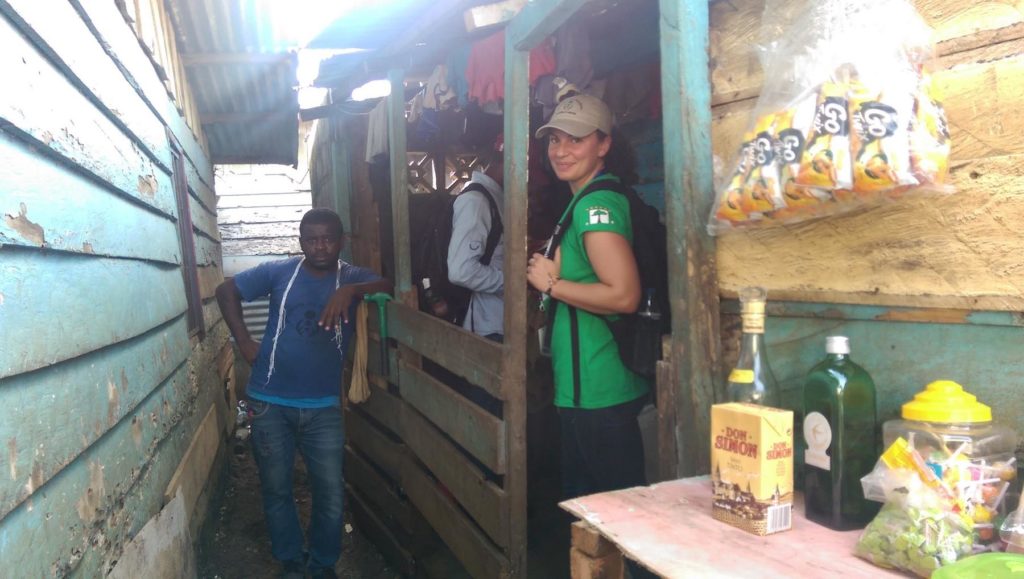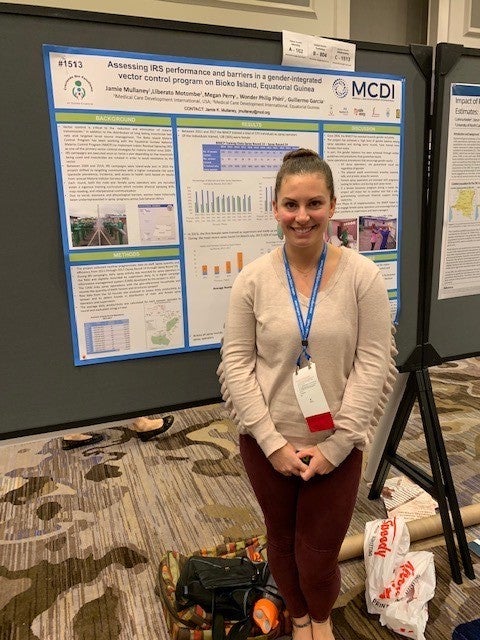Jamie Mullaney ’15
Business Development Officer, MCDI

What drew you to Georgetown’s M.Sc. in Global Health program?
During a Semester at Sea (Class of Spring ’07) I became passionate about International Development. However, my bachelor’s degree in sociology hadn’t quite exposed me to the complexities of the field. I felt that a successful career in Global Public Health would require more classroom time. When I saw the Georgetown M.Sc. in Global Health (MSGH) program advertised (on LinkedIn), I applied right away! The condensed course schedule and the Field Research Module seemed to provide the perfect opportunity to learn about the intricacies of development in low- and middle-income countries with the added value of field experience. The breadth of the courses offered by the MSGH program helped me feel confident that I would graduate with a broad understanding of the Global Health context.
What was the classroom instruction like? Did you do any additional research work?
The MSGH program was immersive, covering everything from Biostatistics to Epidemiology, Health Economics to Health Systems and Policy. Though many of the topics were brand new to me (I had no idea what a demand curve looked like before 2014), I never felt like I was drowning in information. The expert professors were patient, attentive, and incredibly engaging. Course assignments were always relevant and helped to build the foundation for future independent work. For my Graduate Assistantship, I was paired with Dr. John F. May, a Population Policy Specialist, who exposed me to the world of Demography. The opportunity to work with him provided “real world” experience and provided a new lens through which to look at development. I found this topic (and Professor) so engaging, and I am so thankful that I was able to support his work.
Where did you complete your Field Research Module, and what was your project?
In September 2014, two fellow classmates and I travelled to San Cristobal de las Casas in Chiapas, México to begin our studies at El Colegio de la Frontera Sur (ECOSUR). I chose Chiapas, México because I have always had a deep interest in how international development affects indigenous populations. The Health Department at ECOSUR, led by Dr. Héctor Ochoa and supported by his wife, Rosario, and Dr. Gerardo González, provided great resources in support of my qualitative research project. In particular, I studied the effects of participation in a weaving cooperative on reproductive health behaviors. Getting access to these groups proved to be difficult and unfortunately the findings of my study were inconclusive due to a small sample size. Though my research did not yield the results we hoped for, the experiences I gained during the course of the project were paramount. During the 16 weeks I: visited a health clinic and met a traditional partera (midwife) in Huehuetenango, Guatemala; met with Managers from three indigenous cooperatives; joined a group of medical students who attended a field clinic in a small village called Zinacantán; met the Medical Director of Esquipulas Medical Center, focused on serving indigenous populations, and; was invited into the homes and workplaces of 15 Mayan women.
What did you learn from the experience abroad?
With support from the Health Team at ECOSUR, I learned how to develop a culturally sensitive survey and how to best conduct key-informant interviews. I learned that networking is key when trying to gain access to marginalized groups, and that it takes time to earn trust in that small circle. I learned that research is hard, research in developing countries can be even harder, and research in an entirely different language is the hardest! (Most of my interviewees spoke Tzotzil or Tzeltal – two of many indigenous Mayan dialects.)
What has been your career path since completing the program? Has the degree helped?
Since completing the MSGH program I have worked in a number of roles focusing on international development. Right out of grad school, I joined Management Sciences for Health (MSH) as a proposal recruiter, working with the Business Development (BD) Team to identify key personnel for upcoming grant applications. In that role I travelled to both Nairobi, Kenya and Abuja, Nigeria to meet field staff, conduct interviews, and support proposal development. In 2017, I moved to a new role at Medical Care Development International (MCDI) where I have supported 6 different health projects focused on preventing zika, malaria, and cervical cancer. I have travelled to San Salvador, El Salvador, Malabo, Equatorial Guinea, and attended the Multilateral Initiative on Malaria Conference in Dakar, Senegal. This past year (2018) I presented my first poster at the American Society for Tropical Medicine and Hygiene (ASTMH) Annual Meeting. Currently, I am a Business Development Officer here at MCDI, where I support the organization’s strategic plan through relationship building, proposal development, and knowledge management. In a BD role, we are often required to learn and master new subject matter on a monthly and even weekly basis. My experience at Georgetown University prepared me for these “crash course” demands. The interdisciplinary nature of the courses offered by the MSGH program gave me a basic understanding of many subject areas, providing a foundation of Global Health methods and topics.
What makes Washington, DC a great place to pursue graduate study?
I moved to Washington, D.C. on the first day of the MSGH program in 2013 and I haven’t looked back. A program in the District provides access and exposure to so many opportunities for professional growth. The international development community here is focused on engaging with and learning from one another, and not a week goes by without news of an upcoming workshop or conference. The social nature of the city also encourages that cross-learning and collaboration, and the sheer number of international organizations both large and small is an asset during a job hunt!
Would you recommend Georgetown’s MSGH program to a budding global health professional?
The MSGH program at Georgetown University is a great choice for anyone looking to continue their education in Global Public Health. The professors provide amazing context due to their first-hand experience working in the field as scholars. The broad exposure to Global Health topics provides the opportunity for students to build a strong technical foundation. The long-standing connections with investigative centers in low- and middle-income countries provide a great platform for learning research students. The lasting connections I made at Georgetown with colleagues and professors will impact my professional development for years to come!

